
Divorce in Dubai for Indians: Legal Help & Mediation 2025
Table of Contents ▼
Divorce can be a stressful and emotional experience, especially when you’re navigating the laws of a foreign city like Dubai.
Indian nationals planning a divorce in Dubai should be well-informed about the process.
This overview explains the legal steps and requirements for divorce in Dubai for Indians.
Beginning the Process
Indian nationals wishing to divorce in Dubai initiate the process by submitting an application to the Family Guidance Section at Dubai Courts. Muslim expatriates divorce under Sharia Law, and non-Muslims may apply their personal laws according to Federal Law No. 28 of 2005, which permits non-citizens to use their native legal systems.
This step is required for both Muslim and non-Muslim expatriates, including Indian nationals, as it aims to facilitate reconciliation before the divorce case proceeds further.
Required Documents
When filing for divorce in Dubai for Indian nationals, certain documents are needed. These include your marriage certificate, which must be translated to Arabic if it’s not already in that language.
Both partners must provide passport and visa copies. If children are involved, their passports and visa documents are also necessary. Upon receipt, the Family Guidance Section will assign a conciliator to start mediation.

Mediation and Conciliation Process
For divorce in Dubai for Indians, mediation is a required procedure. The conciliator facilitates communication and resolution of issues like child custody and financial matters without legal representation. If the couple fails to settle, the conciliator provides a referral letter for the case to proceed to court.
Court Proceedings for Divorce
If mediation efforts are unsuccessful, the divorce case moves to court for formal adjudication. Both spouses have the chance to submit evidence and argue their positions. The court decides on divorce matters including custody, financial support, and division of property.
Evidence Presentation: Evidence such as financial documents and witness statements must be presented by both parties.
Legal Representation: Legal representation is allowed in court, unlike mediation. Hiring an experienced family law attorney in the UAE is highly advisable for contested cases.
After considering all evidence and hearing arguments, the court issues its ruling on the divorce.
Choosing Between UAE Law or Indian Law for Divorce in Dubai for Indians
For Indian nationals, divorce proceedings in Dubai may be carried out under either UAE law or Indian law depending on the couple’s circumstances and mutual consent.

Divorce Under UAE Law
With mutual consent, couples can divorce under UAE law, with the Dubai courts overseeing the entire process. This is the standard and most common approach among Indian nationals seeking divorce in Dubai for Indians.
Divorce Under Indian Law
Couples preferring Indian law can file for divorce at the Indian consulate in the UAE. This process follows Indian legal rules, and working with a lawyer experienced in both Indian and UAE family law is recommended.
Financial Matters and Alimony
Financial aspects are vital in divorce in Dubai for Indians, including alimony and division of property. Courts may order monthly alimony to support the financially dependent spouse. The amount is based on factors like how long the marriage lasted, each spouse’s financial contributions, and the standard of living during the marriage.
Property and other assets owned by the couple are divided by the court to ensure a fair and balanced outcome for both parties.

Child Custody
Child custody is an essential concern in divorce in Dubai for Indians. The court prioritizes the child’s welfare, often awarding custody of younger children to the mother while granting fathers visitation rights. The court evaluates the child’s education, emotional well-being, and relationship with each parent to make informed custody decisions.
Finalizing the Divorce
After ruling on custody, alimony, and asset division, the court finalizes the divorce for Indian nationals in Dubai. Both parties receive a divorce certificate, which officially updates their marital status in governmental and legal records.
Considerations for Indian Nationals Seeking Divorce in Dubai
For divorce in Dubai for Indians, it’s crucial that all documents, like passports and marriage certificates, are translated into Arabic to comply with the court system.
Engaging a lawyer experienced in UAE divorce law is advisable, especially in contested cases involving finances, custody, or property. Mediation is mandatory before court hearings.
The court prioritizes child welfare, often granting custody to mothers of younger children and ensuring financial support. Enforcement of rulings on international assets should also be understood.
Conclusion
Divorce in a foreign country can be challenging, but for divorce in Dubai for Indian nationals, having the right guidance makes all the difference.
Whether following UAE law or Indian law, Easy Wedding provides expert advice to ensure a smooth and fair divorce process.
Our team is committed to making your divorce in Dubai as seamless as possible and also assists Indians with court marriages.

